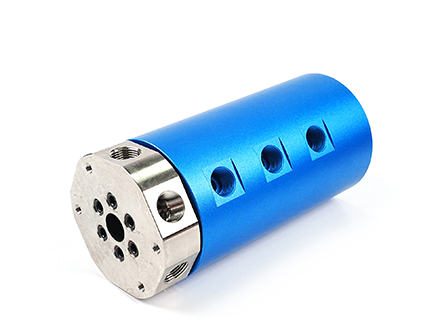Information
Focus on RHD Precision Industry - Get to know the new information of the industry quickly!

2025-08-30 08:56:01
Slip Rings are one of the most essential components in alternating current (AC) generators. Their main function is to provide a continuous electrical connection between the rotating coil (rotor) and the stationary external circuit, allowing the smooth transfer of generated electricity. Without Slip Rings, the generated alternating current could not be delivered efficiently to the load. In other words, Slip Rings ensure that the energy generated by mechanical rotation is converted into usable electrical power.
A slip ring is a circular conductive ring, usually made from highly conductive materials such as copper, brass, or graphite composite. It is mounted on the rotating shaft of the AC generator. Stationary brushes, typically made of carbon or graphite, remain in contact with the slip ring surface. This arrangement allows the generated alternating current in the rotor winding to be transferred continuously to the external circuit without tangling wires.
The slip ring is different from commutators used in DC machines, as Slip Rings provide uninterrupted and smooth transmission of alternating current without switching the polarity.
In an AC generator, the rotor (armature) rotates inside a magnetic field. According to Faraday’s Law of Electromagnetic Induction, an electromotive force (EMF) is induced in the winding. This EMF is alternating in nature because the rotor continuously cuts through magnetic flux lines. The slip rings rotate with the rotor, and the brushes slide on the slip rings, picking up the alternating current and delivering it to the external load.
Continuous Electrical Contact
Slip rings provide uninterrupted transmission of current from the rotating part of the generator to the stationary load. They are designed to handle current densities up to 10 A/cm² depending on material choice and brush design, ensuring stable contact even at high speeds.
Low Electrical Resistance
High-quality copper slip rings typically have a resistivity of 1.68 µΩ·cm, minimizing power loss during current transfer. This is crucial for large-scale power generation where even small resistance values can cause significant efficiency losses.
Durability Under High Speed
Slip rings are designed to operate reliably at rotational speeds of 500–6000 RPM. Surface treatments such as silver or gold plating may be applied to enhance conductivity and reduce wear, extending service life.
Heat Dissipation
During operation, brushes and slip rings generate frictional heat. Good slip ring design ensures thermal stability, capable of withstanding operating temperatures of -40°C to +120°C, making them suitable for harsh industrial environments.
Wear Resistance
Graphite or carbon brushes in contact with slip rings reduce wear due to their self-lubricating properties. Average wear rate is 2–5 mm per 10,000 hours of operation, depending on load and environment.
Noise and Signal Integrity
For power transmission, slip rings ensure minimal electrical noise. High-performance slip rings can maintain signal distortion under 0.01%, which is critical for generators connected to sensitive equipment.
Power Plants
In hydroelectric, thermal, and wind power plants, slip rings are integral in transferring generated electricity from large AC alternators to the grid.
Wind Turbines
Slip rings enable the transmission of power and control signals from the rotating blades (hub) to the stationary nacelle, ensuring smooth operation of the turbine system.
Aerospace and Defense
AC generators in aircraft rely on slip rings to deliver consistent electrical output for navigation, communication, and safety systems, where reliability is paramount.
Industrial Machinery
Slip rings are used in rotating machinery such as cranes, packaging machines, and rotary tables where continuous current transmission is needed during rotation.
Marine Generators
Ships equipped with AC generators use slip rings to power essential onboard systems such as navigation, radar, and communication devices.
To ensure long service life and reliability, slip rings require proper maintenance:
Regular Inspection
Inspect slip rings every 2,000–5,000 operating hours for surface wear, roughness, or discoloration.
Check brushes for even contact and measure wear length; replace if worn beyond 50% of original size.
Cleaning
Dust, carbon deposits, and oil contamination should be removed using non-abrasive cleaning solutions.
Use lint-free cloth or compressed air to keep the surface clean.
Lubrication
Most slip rings are self-lubricating with carbon brushes, but in some cases, a thin film of conductive lubricant is applied to reduce friction.
Alignment Check
Ensure brushes are properly aligned with the slip ring surface to avoid sparking or uneven wear. Misalignment can cause localized overheating.
Monitoring Temperature and Vibration
Slip ring assemblies should be monitored with temperature sensors and vibration analysis. Overheating beyond 120°C or excessive vibration may indicate mechanical imbalance.
Replacement Policy
Depending on duty cycle, slip rings may require resurfacing or replacement every 20,000–30,000 operating hours to maintain efficiency.
Slip rings play a vital role in the operation of AC generators by providing a reliable and continuous electrical connection between rotating and stationary components. With features such as high conductivity, durability under high speeds, and resistance to wear, they ensure efficient power transmission in demanding industrial, marine, and aerospace applications. Regular inspection and maintenance are essential to maximize their service life and prevent downtime.
By understanding the purpose, features, applications, and care of slip rings in AC generators, industries can ensure stable power generation and reduce operational risks.

Phone: +86 13622631318
Email: info@reehonde.com
Add: Room 301, Building 1, No. 11, Dalingshan Lakeside South 1st Street, Dalingshan Town, Dongguan City, Guangdong Province, China
Copyright © 2025 Dongguan Rui-Hong-De Precision Industry Co., Ltd All rights reserved. Privacy policy | Terms and Conditions